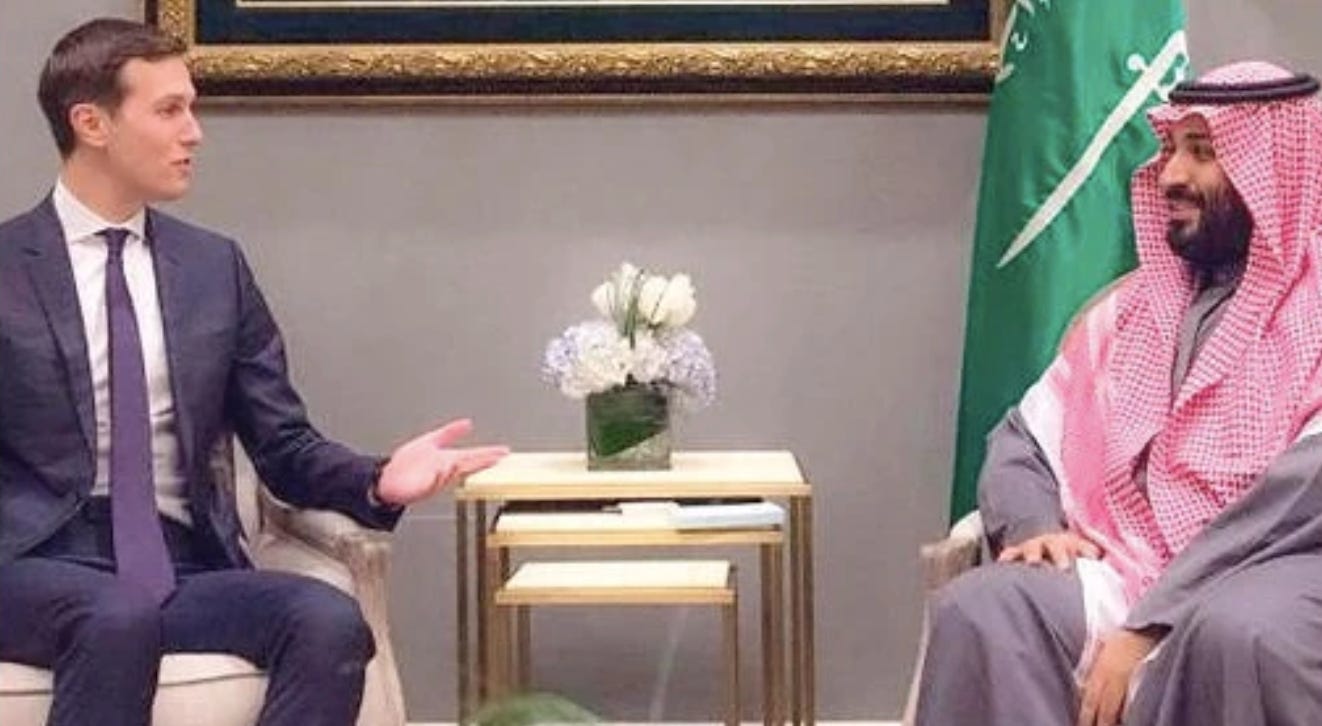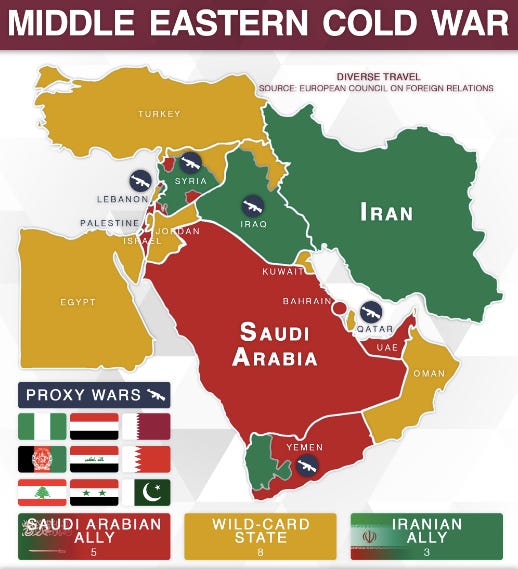This week news broke that Saudi Arabia’s ruler overruled his financial advisors and invested $2 billion in a fledgling investment fund managed by Jared Kushner, son-in-law of ex-President Trump. Of this eyebrow-raising transaction, The New York Times wrote: “Ethics experts say that such a deal creates the appearance of potential payback for Mr. Kushner’s actions in the White House — or of a bid for future favor if Mr. Trump seeks and wins another presidential term in 2024.”
What follows is the back story about the relationship between Saudi Crown Prince Mohammed bin Salman and Jared Kushner, published in my May 6, 2021 newsletter with updates. The $2-billion transaction makes this information relevant once more.
In 2018, Saudi journalist Jamal Khashoggi was lured into an embassy in Turkey and then assassinated. He was Editor in Chief of Al-Arab News Channel and a columnist for The Washington Post who had fled his homeland in 2017 and been highly critical of Saudi rulers -- the ailing King Salman and Crown Prince Mohammed bin Salman (MBS). He championed human rights and opposed the Saudi bloodbath in Yemen.
His death was grisly and cruel. He entered the consulate and 15 Saudi agents awaited him with a bone saw. They killed him, then dismembered him — an act of desecration strictly forbidden in Islam — in order to deny him a dignified burial. His remains disappeared and the deed was taped, according to Turkish police. British and American intelligence agencies later said seven of the 15 killers were MBS’s personal bodyguards and that the Royal Prince “very likely” ordered the killing. That’s when some commentators began referring to him as MBS, saying the acronym stood for “Mister Bone Saw”.
The American reaction was muted in the United States because the Saudis were playing footsie with President Donald Trump and his son-in-law Jared Kushner, who described MBS as a “friend”. And this was not just royal name-dropping. The two “Princes” became so entwined in business and diplomacy that they were able to redraw the geopolitical map of the Middle East, bolster their respective family fortunes, and nearly make the world more dangerous by giving nuclear technology to Mister Bone Saw.
What follows are facts and dates drawn from news stories that appeared in obscure real estate trade journals, business sections, and tedious Congressional hearings. It involves a Canadian holding company, a nasty gang-up against U.S. ally Qatar by Saudi Arabia and the Trump regime, and involvement with Kushner family friend Israel’s ex-Prime Minister Benjamin Netanyahu. It was a Grand Game involving the Prince and Jared to settle scores, bail out a bad investment decision by the Kushner family, and nuclearize Saudi Arabia in contravention of the Treaty on the Non-Proliferation of Nuclear Weapons, the cornerstone of post-war peace and security.
MBS and Jared tried to get a bomb for Saudi Arabia, believing that this would be a desirable countervail to Iran. Israel, the only nuclear power in the region, bought into the idea due to Kushner’s coziness with Netanyahu who was a family friend and needed a friendly Arab friend in the region. In return, MBS publicly stated in 2018 for the first time that both “the Palestinians and Israelis have the right to have their own land”. These links redrew the Cold War Map of the Middle East — with Saudi Arabia and Iran as counterbalancing nation-states -- which is not a bad thing, but it all came about because Jared overpaid for a Manhattan skyscraper in 2007.
In 2007, Jared was only 26 years of age and had become CEO of Kushner Companies after his father, Charles Kushner, was jailed for illegal campaign contributions, tax evasion, and witness tampering. He wanted to crack the big time and so he put up his family’s New Jersey assets to buy a prestigious Manhattan 48-story skyscraper at 666 Fifth Avenue for $1.8 billion. His timing was awful. The stock market crashed, real estate values tanked, and he spent years trying to sell or improve its profits and refinancing properties to keep it all afloat.
In 2009, the Kushner and Trump families “merged” when Jared married Ivanka Trump. He also played an important role in the Trump presidential campaign in 2016 and became a senior White House advisor. But nepotism and concerns about conflicts of interest dogged him, appropriately, and he was barred from Top Security clearance until May 2018 when his father-in-law finally intervened.
According to an extensive timeline of news reports, and an analysis prepared by high-level national security law publication JustSecurity here, Jared’s father, Charles Kushner had served his sentence and in early 2017 convinced Anbang Insurance Group, with links to the Chinese government, to buy the family’s troubled skyscraper. The deal fell through, due to concern by Beijing about appearances given Jared’s involvement in his father-in-law’s White House. Next, Kushner approached the Qatar Investment Authority in April 2017. It also declined.
Then, in May 2017, President Trump broke with tradition after his Inauguration by making his first official foreign trip to Saudi Arabia instead of to Canada. During that official visit, Jared Kushner and security advisor Steve Bannon met for a private dinner with Saudi and United Arab Emirate leaders who wanted to impose a blockade on Qatar. Then-Secretary of State Rex Tillerson was unaware of the meeting because he had fiercely opposed the blockade. And it made no strategic sense because, among other reasons, Qatar was home to the biggest U.S. military base in the Middle East.
But suddenly, on June 5, 2017, Saudi Arabia, the United Arab Emirates, Bahrain, and Egypt severed diplomatic relations with Qatar, then severed all trade and travel links. The Trump White House supported this despite State Department's internal objections. Qatari officials later said to NBC News that they believed the White House's position on the blockade was retaliation “driven by Kushner who was sour about the failed [real estate investment] deal” and also came about because of Saudi Arabia’s and UAE’s dislike of Qatar.
Five months later in November 2017, Kushner Companies received a loan — a $184-million loan from a Qatar-supported company for a Chicago property — following meetings with the Qatari lender in the White House held with Jared Kushner.
As the blockade of Qatar continued, two more transactions occurred: On January 4, 2018, a Canadian company named Brookfield Asset Management (a Qatar sovereign fund was a large shareholder) announced a subsidiary was buying Westinghouse Electric Co. LLC, the bankrupt nuclear services company for $4.6 billion. The acquisition was surprising because Brookfield was involved in real estate and renewable energy projects, not nuclear. But the Reuters story explained why: “Westinghouse has joined a consortium bidding to provide nuclear power in Saudi Arabia, one of the biggest new markets in the world.”
Two days later, Brookfield announced its $1.28 billion purchase of Kushner’s 666 Fifth Avenue — “owned by the family of Donald Trump’s son-in-law” pointed out in The New York Times. Not surprisingly, the blockade by the Saudi-led coalition against Qatar (whose sovereign fund with Brookfield bought Kushner’s troubled building) was eventually lifted by Trump just before the end of his tenure on January 4, 2021.
“This sequence of events, especially the stunning reversal in U.S. policy towards Qatar, raises serious questions about what role Jared Kushner — and the financial interests of his family — may have played in influencing U.S. foreign policy regarding the blockade,” wrote a group of Democrats in Congress who launched an investigation on December 9, 2020, into the whole questionable business.
Before that, in 2019, the House Oversight Committee held a hearing into the administration’s planned $80-billion mega-deal for reactors in Saudi Arabia and elsewhere that were linked to the Westinghouse deal. The Committee said "multiple whistleblowers" informed it that Trump administration appointees -- led by fired national security advisor Michael Flynn, Trump friend Tom Barrack, and former Energy Secretary Rick Perry -- pursued selling nuclear power plants to Saudi Arabia over the objections of top national security officials. Worse, they claimed, the plan was to transfer nuclear technology to the Saudis without any Congressional review.
Questions were raised. Was Qatar strong-armed into bailing out the Kushner family and did the Kushner-Trump White House facilitate a nuclear deal with a medieval country that chops up journalists, ignores human rights, and blows up children in Yemen? The Qataris have denied that they knew in advance what Brookfield (they owned a portion of the Brookfield entity) was doing until the Kushner real estate deals were completed. As for the nuclear piece, The New York Times wrote in February 2019: “By ramming through the sale of as much as $80 billion in nuclear power plants, the Trump administration would provide sensitive know-how and materials to a government whose de facto leader, Crown Prince Mohammed bin Salman, has suggested that he may eventually want a nuclear weapon as a hedge against Iran and has shown little concern for what the rest of the world thinks.”
The nuke deal never happened, but the ethics and other violations that may have taken place in Trump’s White House should still be probed. Unfortunately, Trump exempted his staff (and son-in-law) from culpability for any ethical wrongdoing with a stroke of the pen on his way out the exit — which likely blocks that possibility.
Today Jared’s business success in the Middle East grows and Trump’s former Treasury Secretary Steve Mnuchin also has cashed in and set up a hedge fund on behalf of sovereign funds in the Gulf States. In January 2021 after taking office, President Joe Biden imposed sanctions on 21 Saudi officials in January 2021, but not on the Crown Prince. And recently Turkey transferred the Khashoggi murder case to Saudi Arabia, effectively ending any hope of bringing the murderers to justice.
In Washington, the consensus is that Sordid Arabia remains central to America’s objectives to keep Iran at bay, support Israel, and as a proxy to fight radicalism in its Kingdom and the region. As for the rest involved in this tale, Brookfield is stuck with too much New York real estate and is considering the sale of a portion of Westinghouse, the Kushners are billionaires, and Jared got $2 billion for his new fund.
“Kushner’s Saudi [$2-billion] deal must be scrutinized to protect U.S. democracy,” wrote Ali Al-Ahmed, director of the Institute for Gulf Affairs in the Washington Post last week. He said the transaction raises many questions including the Crown Prince’s disdain for the Biden White House, his support for the Republican Party, and his refusal to increase oil production to replace Russian oil in Europe or to condemn Russia’s invasion itself. “The prospect of a dictator using his deep pockets to wield influence at the highest levels of the U.S. political system should be cause for deep concern and targeted action.”
NOTE: Hit the Share button to send this to social media, but those who wish to email this newsletter to others can do so by forwarding it to another email or, if that doesn’t work, by copying it and pasting it onto another email then sending it in order to avoid the paywall.








And they criticise Putin and his mafia! The Trumps and MBS revolting behaviour in same league but difference is the American people voted in Trump and his crooked family. Interesting Trump chose to got to see MBS and not Trudeau on first official visit. Says it all. Thanks Diane for these amazing revelations.
Play on words, but an interesting thesis - unfortunately one without merit.
I agree with JameSmace.
Appears as an attempted smear by mainstream media.